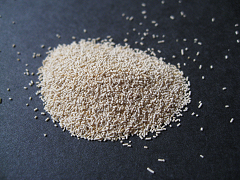Features
Step change for screening could boost biofuels
Date: 2015-03-06 12:42:53.0
Author: The Institute of Food Research (IFR)
 UK — The new technique could also be a boon in the search for new ways of deriving valuable renewable chemicals from plant-based wastes, reducing our reliance on petrochemicals.
UK — The new technique could also be a boon in the search for new ways of deriving valuable renewable chemicals from plant-based wastes, reducing our reliance on petrochemicals.
Yeasts are a key step in producing biofuels, fermenting sugars into ethanol. First generation biofuels used sugars, starch and oils derived from plants grown for that purpose. These, however, may compete with food crops for land and resources, so there has been a lot of interest in producing biofuels from non-food sources, such as agricultural wastes like straw. But a problem with these “second-generation” biofuels is that the sugars are less accessible to the yeasts.
Pretreatments are used to break open the cellular structure of the biomass, and enzymes convert the treated biomass into sugars for yeasts to ferment. But this saccharification process, along with the pretreatments, can reduce the economic viability of producing biofuels in this way. Pretreatments can also generate compounds that stop yeasts from fermenting as efficiently.
To try and boost the efficiency of generating second generation biofuels, The Biorefinery Centre at IFR has joined forces with the National Collection of Yeast Cultures (NCYC), a BBSRC-supported National capability, also within IFR. NCYC has over 4,000 different yeast strains in its collection. Screening this collection could find yeasts that are naturally better at producing biofuels, especially if they are able to cope better with the compounds that reduce fermentation efficiency of conventional yeast strains. Simultaneous Saccharification and Fermentation (SSF) is seen as a big step forward for biorefining, as it simplifies the overall process, reducing costs.
Screening thousands of yeasts under different conditions and on different starting materials needs a high-throughput system to cope with large numbers of samples quickly and reproducibly. But there were no ways of doing this with solid ‘real-world’ sources of biomass, such as bales of wheat straw. Experiments on these sorts of substrates are typically done in flasks, but the researchers needed to develop a way of reducing the volumes they were working by a factor of a hundred, using 96 well plates that are the mainstay of high throughput processing.
They developed a technique that allowed them to accurately and reproducibly measure tiny quantities of pretreated biomass. Extensive trials showed that bioethanol yields were the same as using conventional, larger scale flasks.
The new technique will also make it easier to screen for yeasts and other microorganisms that could be harnessed to produce other biobased chemicals or pharmaceuticals.
Professor Keith Waldron, Director of the Biorefinery Centre said, "We are now in a position to use this technology to screen different biomass sources, different microbial fermenting organisms, and different conditions rapidly in order to evaluate different combinations".
The Biorefinery Centre is now able to carry out commercial screening in rapid, high throughput screening for biorefining.
About The Institute of Food Research (IFR)
Our mission is to be an international leader in research that addresses the fundamental relationships between food and health, food and the gut and the sustainability of the food chain in order to further the production of safe, healthy foods.
The IFR is one of eight institutes that receive strategic funding from the Biotechnology and Biological Sciences Research Council (BBSRC). It also receives funding from government agencies and departments, the EU, charities and industry, from the UK and overseas.
The IFR publishes its research widely in peer-reviewed scientific literature. In 2009, IFR was ranked second in the world in the field of agricultural and food sciences, based on the impact of its research papers.
For further information about The Institute of Food Research (IFR), please visit the website here
Displaying 3 keywords used to tag this article:
- carbon capture
- patents
- enzymes
